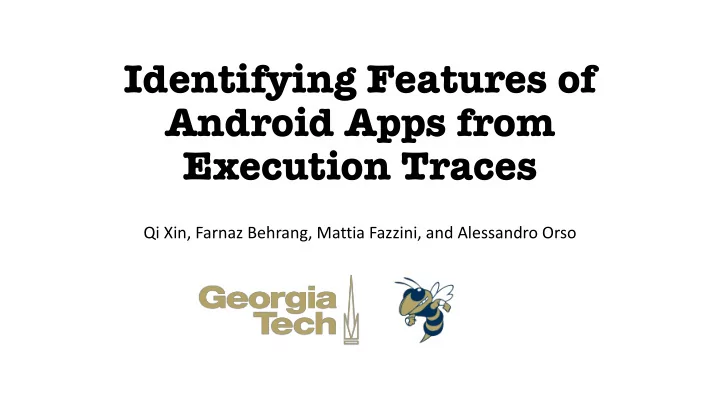

Identifying Features of Android Apps from Execution Traces Qi Xin, Farnaz Behrang, Mattia Fazzini, and Alessandro Orso
Understanding a Program & its Features Debugging Refactoring Debloating Testing Documentation Functionality Modification
Understanding a Program & its Features Identifying Features of a program by Analyzing its Executions
Program Understanding is HARD Figure from Understanding Execution Traces Using Massive Sequence and Circular Bundle Views by Cornelissen et al.
Program Understanding is HARD ~50% maintenance effort spent on program understanding alone* Figure from Understanding Execution Traces Using Massive *Program understanding: Challenge for the 1990s by Corbi Sequence and Circular Bundle Views by Cornelissen et al.
Our Approach • Identifies features by analyzing execution trace • Targets Mobile (Android) apps • In our context, a feature is a sequence of user events that exercise some functionality of the app
Our Approach • Identifies features by analyzing execution trace • Targets Mobile (Android) apps • In our context, a feature is a sequence of user events that exercise some functionality of the app
Login Feature of WordPress 1 2 3
Login Feature of WordPress 5 6 4
Login Feature of WordPress 7
High-level Approach Trace
High-level Approach S0 S1 S2 S3 S4 S5 S6 S7 S8 S9 S11 S10 Trace
High-level Approach Feature0 Feature1 Feature2 Feature3 S0 S1 S2 S3 S4 S5 S6 S7 S8 S9 S11 S10 Trace
FeatureFinder
FeatureFinder Instrumentation Capture execution information • Stacks of Method Calls • Activities & Fragments • User Events • Touch event & widgets Instrumented App App • Keyboard event & labels Step 1
FeatureFinder Execution User User executes the app to exercise its features Trace File Instrumented App Step 2
FeatureFinder Splitting Split the trace into segments by user events Segments Trace File Step 3
FeatureFinder Clustering Group “related” segments • Compare execution info • Use a classifier to decide “relatedness” Segments Clusters Step 4
Clustering algorithm S0 S1 S2 S3 S4
Clustering algorithm S0 S1 S2 S3 S4
Clustering algorithm S0 S1 S2 S3 S4
Clustering algorithm S0 S1 S2 S3 S4 Vector_S0_S1 A numeric vector encoded as the comparison b/w S0 and S1
Clustering algorithm S0 S1 S2 S3 S4 Vector_S0_S1 A trained classifier
Clustering algorithm S0 S1 S2 S3 S4 Merge Vector_S0_S1
Clustering algorithm S0 S1 S2 S3 S4
Clustering algorithm S0 S1 S2 S3 S4 Vector_S0_S1
Clustering algorithm S0 S1 S2 S3 S4 Merge Vector_S0_S1
Clustering algorithm S0 S1 S2 S3 S4
Clustering algorithm S0 S1 S2 S3 S4 Vector_S0_S1_S2 Don’t Merge
Clustering algorithm S0 S1 S2 S3 S4
Clustering algorithm S0 S1 S2 S3 S4 Vector_S3_S4 Merge
Clustering algorithm S0 S1 S2 S3 S4
FeatureFinder Labeling Label each cluster • Use activity & fragment names • Rank names by TF-IDF values Labeled Clusters Clusters • Select the top-10 (Features) Step 5
WordPress DailyMoney Case Study PasswordMaker Music Player K-9 Mail • Conducted a study using 5 apps • Exercised different app features and generated traces • Used 4 apps for classifier training • Evaluated FeatureFinder on the other app K-9 Mail Two Trace for each App
Classifier Training • Used FeatureFinder to split trace into segments • Manually Identified clusters • Generated 490 segments pairs labeled as “ Merge ” & “ Don’t merge ” • Trained 10 classifiers • Used the best: k-NN (k=10)
Features for Trace 0 ft04 ft05 ft06 FeatureFinder ft01 ft02 ft03 Human fh01 fh02 fh04 fh03 fh05 fh06
Features for Trace 0 MessageViewFragment FolderSettings MessageList FolderList ft04 ft05 ft06 MessageCompose MessageList MessageList FeatureFinder ft01 ft02 ft03 MessageListFragment Human fh01 fh02 fh04 Email Checking Email Composing Managing Folders Email Checking fh03 fh05 fh06
Evaluation Results • Manually identified 11 feature clusters ( ground truth ) • FeatureFinder generated 9 clusters • Identified 6 of the 11 ( 55% ) features • Labels generated are in close meaning to the human labels
Conclusion & Future work • FeatureFinder identifies features from app’s execution traces • Case study results, albeit preliminary, are promising • As future work • Perform a user study • Extend FeatureFinder to identify features hierarchically • Define a visualization for showing the features
Recommend
More recommend